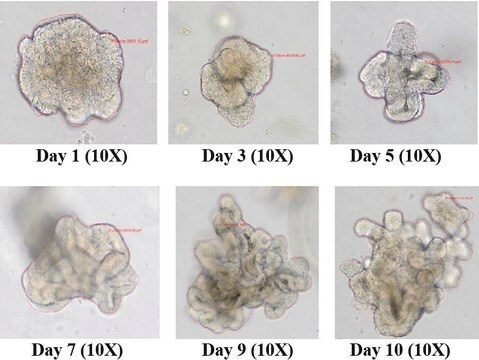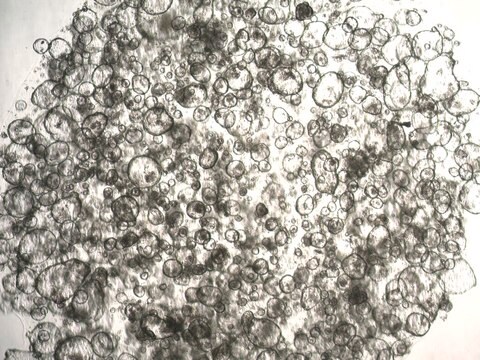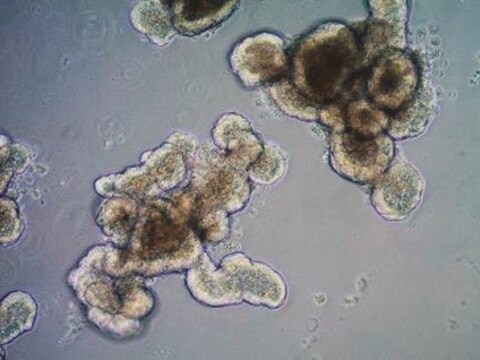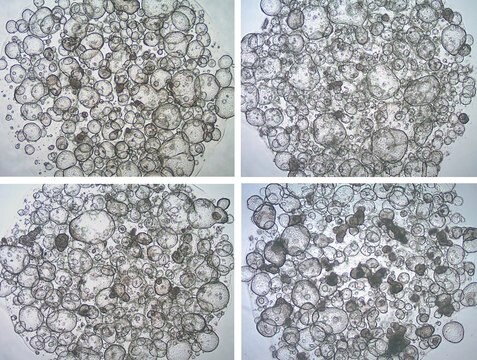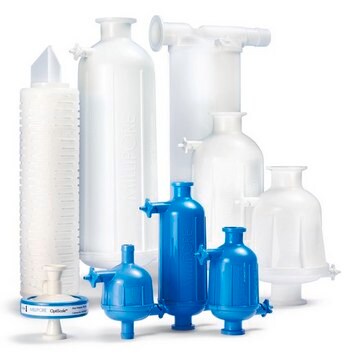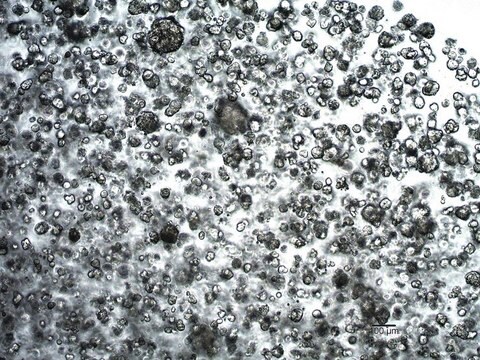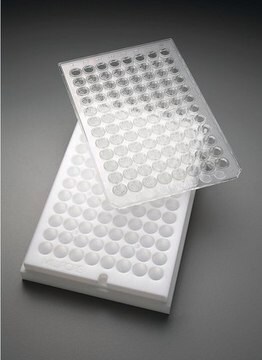SCC721
3dGRO® Colorectal Organoids (CSC.240)
Synonim(y):
Organoid guza okrężnicy, Organoid okrężnicy, Organoid raka jelita grubego, Organoidy ludzkiego raka jelita grubego
Zaloguj sięWyświetlanie cen organizacyjnych i kontraktowych
About This Item
Kod UNSPSC:
41106514
NACRES:
NA.81
Polecane produkty
pochodzenie biologiczne
human
Poziom jakości
opakowanie
vial of ≥1500 organoids vial
producent / nazwa handlowa
Millipore
metody
cell culture | stem cell: suitable
Warunki transportu
liquid nitrogen
temp. przechowywania
−196°C
Zastosowanie
- Żywotność: >=1500 żywotnych organoidów/fiolkę
- Wzrost organoidów: Wynik pozytywny
- Komórki są testowane pod kątem chorób zakaźnych za pomocą panelu Human Essential CLEAR firmy Charles River Animal Diagnostic Services.
- Zanieczyszczenie mykoplazmą: Negatywny
- Profil STR: Wynik pozytywny
Cechy i korzyści
Kriokonserwowane organoidy raka jelita grubego (PDO) pochodzące od pacjentów
Opis wartości docelowych
Rak jelita grubego stanowi około 10% wszystkich przypadków raka na świecie, a u ponad połowy wszystkich pacjentów z CRC rozwija się choroba przerzutowa prowadząca do śmierci. Ostatnio organoidy pochodzące z tkanek stały się bardziej przewidywalnym trójwymiarowym modelem hodowli komórkowej choroby. Hodowle organoidów 3D zachowują oryginalne cechy genetyczne i fenotypowe pierwotnej tkanki, co pozwala na ich zastosowanie w wielu dziedzinach badań, w tym w opracowywaniu leków, medycynie spersonalizowanej i potencjalnych terapiach. Wykazano również, że organoidy nowotworowe hodowane in vitro pozwalają przewidzieć odpowiedź pacjenta na chemioterapeutyki. PDO pochodzące z raka jelita grubego (organoidy CRC) zostały wykorzystane do modelowania komórek i badania funkcji mutacji genów związanych z rakiem, w tym APC, TP53, KRAS, BRAF, PIK3CA itp.
Obecnie oferujemy kompleksowy biobank wysoce scharakteryzowanych ludzkich organoidów żołądkowo-jelitowych pochodzących z tkanek od zdrowych i chorych pacjentów. Biobank organoidów jelitowych zawiera ponad 50 wysoce scharakteryzowanych organoidów jelitowych pochodzących zarówno od zdrowych, jak i chorych pacjentów z wielu regionów układu pokarmowego, w tym jelita cienkiego (dwunastnicy, jelita krętego), żołądka, odbytnicy i okrężnicy.
Charakterystyka linii komórkowej
Obecnie oferujemy kompleksowy biobank wysoce scharakteryzowanych ludzkich organoidów żołądkowo-jelitowych pochodzących z tkanek od zdrowych i chorych pacjentów. Biobank organoidów jelitowych zawiera ponad 50 wysoce scharakteryzowanych organoidów jelitowych pochodzących zarówno od zdrowych, jak i chorych pacjentów z wielu regionów układu pokarmowego, w tym jelita cienkiego (dwunastnicy, jelita krętego), żołądka, odbytnicy i okrężnicy.
Charakterystyka linii komórkowej
- Płeć: Mężczyzna
- Wiek: 83 lata
- Narząd: Okrężnica (guz pierwotny)
- Choroba: Gruczolakorak (mutacja KRAS: typ dziki)
Przechowywanie i stabilność
Przechowywać w ciekłym azocie. Organoidy mogą być hodowane przez co najmniej 10 pasaży po wstępnym rozmrożeniu bez znaczącego wpływu na ekspresję markerów komórkowych i funkcjonalność.
Inne uwagi
10719 jest znakiem towarowym KGaA, Darmstadt, Niemcy.
Organoidy10719 zostały uzyskane przy użyciu technologii HUB Organoid Technology.
Nabywca tego produktu musi wyrazić zgodę na warunki użytkowania HUB, które muszą zostać oddzielnie potwierdzone i zaakceptowane przez takiego nabywcę przed przekazaniem tego produktu nabywcy.
Organoidy10719 zostały uzyskane przy użyciu technologii HUB Organoid Technology.
Nabywca tego produktu musi wyrazić zgodę na warunki użytkowania HUB, które muszą zostać oddzielnie potwierdzone i zaakceptowane przez takiego nabywcę przed przekazaniem tego produktu nabywcy.
Informacje prawne
3dGRO is a registered trademark of Merck KGaA, Darmstadt, Germany
Oświadczenie o zrzeczeniu się odpowiedzialności
O ile nie określono inaczej w naszym katalogu lub innej dokumentacji firmy dołączonej do produktu(-ów), nasze produkty są przeznaczone wyłącznie do użytku badawczego i nie mogą być wykorzystywane do żadnych innych celów, w tym między innymi do nieautoryzowanych zastosowań komercyjnych, zastosowań diagnostycznych in vitro, zastosowań terapeutycznych ex vivo lub in vivo lub jakiegokolwiek rodzaju konsumpcji lub zastosowania u ludzi lub zwierząt.
WYŁĄCZNIE DO CELÓW BADAWCZYCH. Ten produkt podlega regulacjom prawnym we Francji, jeśli jest przeznaczony do celów naukowych, w tym do importu i eksportu (art. L 1211-1 ust. 2 kodeksu zdrowia publicznego). Nabywca (tj. użytkownik końcowy) jest zobowiązany do uzyskania zezwolenia na import od francuskiego Ministerstwa Badań Naukowych, o którym mowa w artykule L1245-5-1 II Kodeksu Zdrowia Publicznego. Zamawiając ten produkt, użytkownik potwierdza, że uzyskał odpowiednie zezwolenie na import.
Ta strona może zawierać tekst przetłumaczony maszynowo.
Kod klasy składowania
12 - Non Combustible Liquids
Klasa zagrożenia wodnego (WGK)
WGK 2
Temperatura zapłonu (°F)
Not applicable
Temperatura zapłonu (°C)
Not applicable
Certyfikaty analizy (CoA)
Poszukaj Certyfikaty analizy (CoA), wpisując numer partii/serii produktów. Numery serii i partii można znaleźć na etykiecie produktu po słowach „seria” lub „partia”.
Masz już ten produkt?
Dokumenty związane z niedawno zakupionymi produktami zostały zamieszczone w Bibliotece dokumentów.
Nasz zespół naukowców ma doświadczenie we wszystkich obszarach badań, w tym w naukach przyrodniczych, materiałoznawstwie, syntezie chemicznej, chromatografii, analityce i wielu innych dziedzinach.
Skontaktuj się z zespołem ds. pomocy technicznej